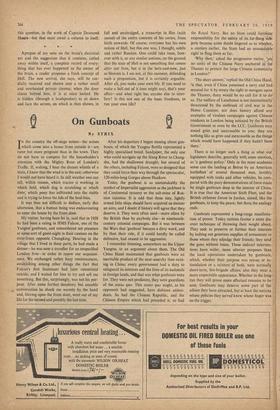On Gunboats
By STRIX
Ithe country the off-stage noises—the noises 'which come into a house from outside it—are rarer but more pregnant than in the town. They do not have to compete for the householder's attention with the Mighty Roar of London's Traffic. lf, waking, I hear the distant whistle of a train, I know that the wind is in the east; otherwise I would not have heard it. In still weather one can tell, within reason, which tractor is working in which field, which dog is scratching at which door, which pony has infiltrated into the stable and is trying to force the lids of the feed-bins.
It was thus not difficult to deduce, early this afternoon, that a human being was endeavouring to enter the house by the front door.
My visitor, having been let in, said that in 1938 he had been a rating in HMS Falcon, one of the Yangtse gunboats, and remembered my presence at some sort of guest-night in their canteen on the river-front opposite Chungking. Hearing in the village that I lived in these parts, he had made a detour—he was now a traveller for an unspecified London firm—in' order to renew our acquaint- ance. We exchanged rather hazy reminiscences, establishing among other things the fact that Falcon's first lieutenant had later committed suicide, and I waited for him to try and sell me something. But this, surprisingly, was not his pur- pose. After some further desultory but amiable conversation he shook me warmly by the hand and, forcing open the front door, went out of my life for the second and possibly the last time. After his departure I began musing about gun- boats, of which the Yangtse flotilla represented a highly specialised breed. Sandpiper, the only one who could navigate up the Siang River to Chang- sha, had the shallowest draught; but several of the others, including Falcon, were so designed that they could force their way through the spectacular, 120-miles-long Gorges above Hankow.
Today the gunboat is as unmistakably the symbol of Imperialist aggression as the jackboot is of Continental tyranny or the salt-mine of Rus- sian injustice. It is odd that these tiny, lightly armed little ships should have acquired so sinister an aura, and I doubt if history will agree that they deserve it. They were often used—more often by the British than by anybody else—in nineteenth- century colonial campaigns. But it was between the Wars that 'gunboat' .became a dirty word, and by then their role, if it could hardly be called defensive, had ceased to be aggressive.
I remember listening, somewhere on the Upper Yangtse, to an argument about them. The Old China Hand maintained that gunboats were an inevitable product of the near-anarchy then exist- ing in China; every government had a duty to safeguard its interests and the lives of its nationals in foreign lands, and that was what gunboats were for. They were not predators, they were guardians of the status quo. This status quo might, as his opponent had suggested, have dubious antece- dents. So had the Chinese Republic, and the Chinese Empire which had preceded it; so had the Royal Navy. But no State could forswear responsibility for the safety of its far-flung sub- jects because some doubt lingered as to whether, a century earlier, the State had an unassailable right to fling them so far.
'Why then,' asked the progressive visitor, 'are no units of the Chinese Navy anchored in the Thames to protect the large Chinese community in London?'
`The short answer,' replied the Old China Hand, 'is that, even if China possessed a navy and had secured for it by treaty the right to navigate upon the Thames, there would be no call for it to do so. The welfare of Limehouse is not intermittently threatened by the outbreak of civil war in the Home Counties; nor does history afford any examples of virulent campaigns against Chinese residents in London being initiated by the British Government or even by the LCC. Gunboats may sound grim and inexcusable to you; they are nothing like as grim and inexcusable as the things which would have happened if they hadn't been there.'
There is no longer such a thing as what our legislators describe, generally with some emotion, as 'a gunboat policy.' Only in the most academic sense can the landing at Beirut by an American battlefleet' of several thousand men, lavishly equipped with tanks and other vehicles, be com- pared with the puny demonstrations of force made by single gunboats deep in the interior of China. It is true that the American Sixth Fleet, and the British airborne forces in Jordan, aimed, like the gunboats, to keep the peace; but there the analogy ends.
Gunboats represented a long-range manifesta- tion of power. Today nations favour a more dis- creet technique of throwing their weight about. They seek to preserve or further their interests by lashing out generous supplies of armaments to those whom they adjudge their friends; they send the guns without boats. These indirect interven- tions have wider, more ulterior purposes than the local operations undertaken by gunboats, which, whether their purpose was rescue or in- timidation or a mixture of both, were normally short-term, fire-brigade affairs; also they wear a more respectable appearance. Whether in the long run they will prove more effectual remains to be seen. Gunboats may deserve some part of the odium they have attracted, but at least the nations whose policies they served knew whose finger was on the trigger.


































 Previous page
Previous page